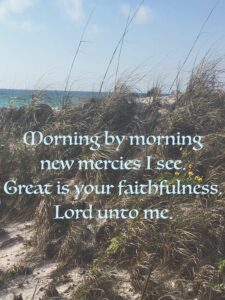Mountains or beach? Given a choice of vacay destinations, I confess that I’m more of a mountain gal. I love being high above sea level with a view of God’s world, nestled in the woods with all manner of trees, flowers, and critters. Still, I must admit that beaches, especially ocean beaches, inevitably and immediately bring me toe-to-toe with the awesomeness–and faithfulness–of the Almighty.
Earlier this year, my daughter and I spent Spring Break in Destin, Florida. We were fortunate that our accommodations included an ocean-front balcony on the 6th floor. In the cool mornings, with a steaming cup of tea, I allowed myself to wake up gently by watching other early risers walking the beach and dolphins rising gently above the water’s surface. All of creation seemed at peace in these moments, and soon enough I would also descend from my perch to welcome the morning more fully, to let my bare feet touch the earth and water, to be among the beach’s residents, and to pick up shells.

© Shana Pack
But first, God. I settled in each morning on the balcony to my daily devotions and for lectio divina practice. For lectio, I choose a poem, other sacred text, or the Bible. I’ve found that Psalms are easy targets for lectio readings. One beachy morning as the sun rose over the Gulf of Mexico, I chose Psalm 89 and landed on verses 5-8:
“The heavens praise your wonders, LORD,
your faithfulness too, in the assembly of the holy ones.
For who in the skies above can compare with the LORD?
Who is like the LORD among the heavenly beings?
In the council of the holy ones God is greatly feared;
he is more awesome than all who surround him.
Who is like you, LORD God Almighty?
You, LORD, are mighty and your faithfulness surrounds you.”

© Shana Pack
Although I’m a relative newcomer to the practice of lectio divina, I can attest to the potential of the practice to draw you nearer to God, especially if you long for more interaction with the Divine. Basically, lectio divina, translated as “divine reading,” is practiced in four steps (or five, depending on your source): 1) reading, 2) reflection, 3) responding, and 4) resting.* In the reading step, you choose a text and listen for a word or phrase that speaks to you at the moment. The second part of verse 8 (“You, LORD, are mighty and your faithfulness surrounds you”) especially resonated with my heart, and it became the center of my reflection, responding, and resting. (More traditionally, these three steps are called meditation, prayer, and contemplation.)
I keep a journal for my lectio divina responses. (I write and draw in it with good ole Crayola colored pencils–nothing fancy, but I must have color!) Responses are highly personal, unedited, and not really meant for anyone else’s consumption or critique. Although lectio is an “unmediated” practice, meaning it’s a direct experience with God, the creation of something tangible helps me extend and cement the experience.
The repetition of verse 8 in my mind–with the repetitive sound of sea meeting shore, the metered calling of sea gulls, and the rhythm of the sun beginning another day–reminded me that God is never still and never stops. I found myself hanging on to the description of God being “surrounded by faithfulness.” God is always faithful to those who call on him and listen to his whispers. And those who do not. His faithfulness simply is. It is part of God’s nature, not something he doles out. It is not a reward, or something anyone could ever earn.
Although I did not plan on sharing my response when I wrote it, I share part of it here with you–this prayer, my beach psalm.
You, LORD, are faithful.
I see this in the waves crashing the beach,
working, working,
rhythm, pulse,
moving, never stopping,
forever, forever,
Lord, you are infinity.
Fill my mind with your wisdom.
Fill my eyes with your vision.
Fill my ears with your voice.
Fill my lungs with your spirit.
Fill my mouth with your songs.
Fill my heart with your presence.
Amen

Photo © Shana Pack
* For this blog post, I relied on the book, Lectio Divina: –The Sacred Art: Transforming Words and Images into Heart-Centered Prayer, by Christine Valters Painter.
A good web source that gives an overview of lectio divina practice can be found here.
#godseyeministry #psalm #lectiodivina #faithfulness